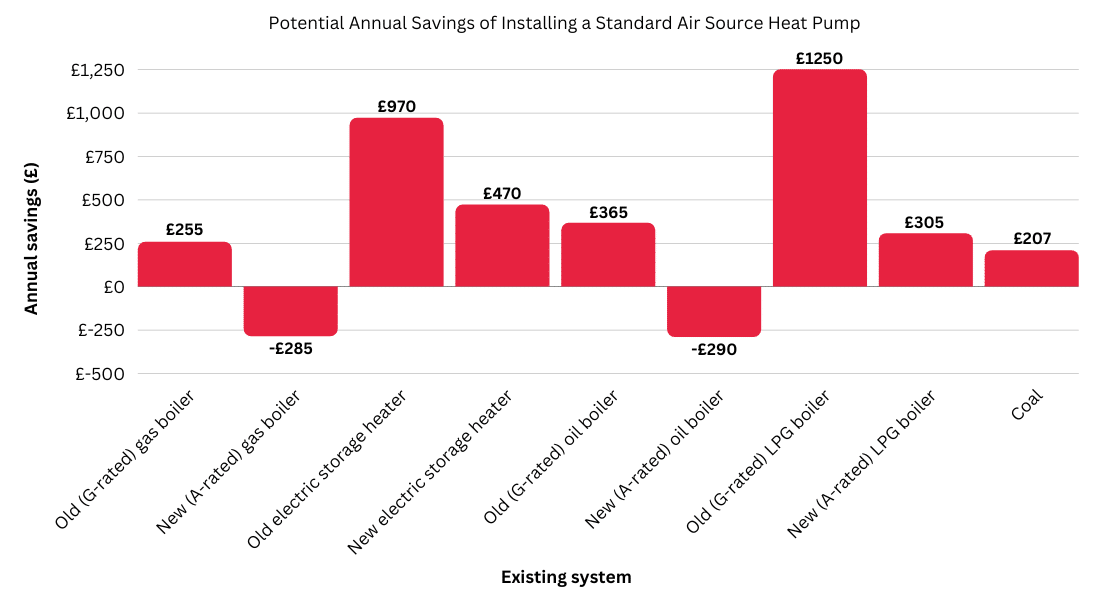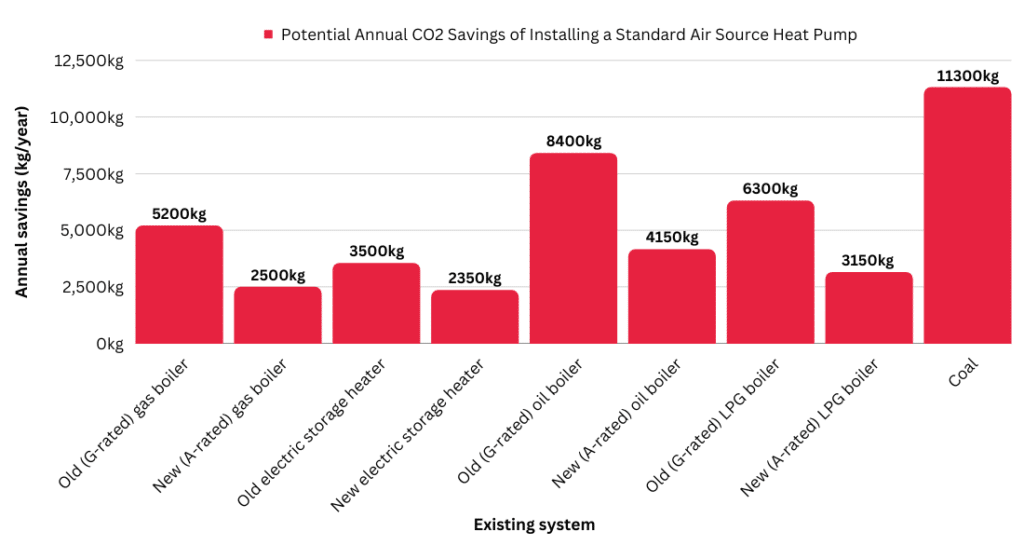Are there government grants for air source heat pumps?
Are there government grants for air source heat pumps?
Discover if you’re eligible to apply for government funding for air source heat pumps and see how much you can save on energy and costs for your home.
Air source heat pumps are slowly but surely taking the world by storm. But recent reports from International Energy Agency show they’ve still got some way to go in only representing less than 10% of global heating equipment sales in 2021.
To encourage more people to invest in low-emission heat pumps, the UK government has lowered costs for ground and air source heat pumps with grants like the Boiler Upgrade Scheme, which offers £7,500 off the price of heat pumps.
Not only does this make eco-friendly heating more affordable for people around the country, but it also helps the UK meet its net-zero emissions targets by 2050.
However, not every home in the UK is suitable for heat pumps. Therefore, you should make sure you do your research before investing. Here’s everything you need to know.
What are the government grants for heat pumps?
There are currently a few Government grants up for grabs in the UK. Most of these schemes provide financial support to cover a percentage of air source heat pump costs, while other grants can cover all the costs to help low-income households.
This financial support is crucial if the government wants Brits to invest in green technology. As it stands, a significant portion of people ranks cost as the most integral factor when evaluating which low-carbon product to purchase.
So, what schemes are in place to help Brits afford heat pumps? Let’s take a look.
Initially called the “Clean Heat” grant, “the Boiler Upgrade Scheme” aims to help people replace their boilers with an eco-friendly alternative like heat pumps. Running from April 2022 until April 2028, this scheme has replaced the Domestic Renewable Heat Incentive (RHI), which closed to new applicants on 31 March 2022.
What is the boiler upgrade scheme, and how does it work?
With this grant, homeowners in England and Wales can get £7,500 off the cost of a new air source heat pump from October 2023 and £7,500 off the price of a ground source heat pump.
The scheme will operate on a “first-come, first-served basis,” with customers pressured to register their interest with air or ground source heat pump installers soon. Overall, this scheme cuts in half the average air source heat pump costs from £10,000 to £5,000, which is a massive saving.
Unfortunately, the government is dedicating a relatively paltry £450 million to this scheme, meaning a maximum of just 90,000 homes will be able to take advantage of the grant over the next three years, so jump on it while you can.
As of the current day (March 2023), statistics for the Boiler Upgrade Scheme are fairly underwhelming. Out of the average of £150 million per year, Ofgem reports that only £54 million has been used in the first year from March 2022 – March 2023. That means the opportunity for you is still possible with plenty of time and funds available to secure your heat pump for your home.
Who’s eligible for the scheme?
All homeowners, small landlords, and private landlords will be eligible to apply for the grant. However, all applicants must have a valid Energy Performance Certificate (EPC). This certificate would need to have been issued in the last ten years, with no outstanding recommendations for loft or cavity wall insulation.
In previous years, homeowners could install heat pumps and get paid for the energy they produce by joining the government’s Renewable Heat Incentive (RHI) scheme. The scheme also covered biomass boilers and solar water heating systems. However, this initiative ended in March 2022 and has been taken over by the Boiler Upgrade Scheme.
The Scottish government’s Warmer Homes Scotland programme offers financial support to low-income households struggling to keep on top of energy bills.
How does it work?
Households can access the scheme by calling “Home Energy Scotland”, which will analyse the necessity of home improvements. All eligible households connect with Warmworks, the managing agent of the Warmer Homes grant. The scheme covers wall insulation, loft insulation, draught-proofing, boilers and heating, and renewable and micro-renewable heating systems.
Who’s eligible for Warmer Homes Scotland?
To get a heat pump grant through Warmer Homes Scotland, applicants must:
- Be a homeowner or the tenant of a private sector landlord.
- Live in the home as their main residence.
- Have lived there for at least 12 months.
- Live in a home that is no bigger than 230 square metres, with an energy rating of 67 or lower.
- Live in a home that meets the tolerable living standard set out in the Housing (Scotland) Act 2006.
- Not have received support for energy efficiency improvements through Warmer Homes Scotland funding in the last five years.
The individual must also be one of the following:
- A pensioner who has no working heating system and receives a passport benefit.
- Aged 75 or older and in receipt of a passport benefit.
- Pregnant, caring for a child under 16, and receiving a passport benefit.
- Someone with a disability and who receives any level of Personal Independent Payment (PIP).
- Someone with a disability and who receives a high-rate Disability Living Allowance (DLA).
- Someone with a disability, who is also in receipt of a low/medium rate Disability Living Allowance (DLA), and in receipt of an income-related benefit.
- A carer with Carers Allowance.
- Someone who has been injured or disabled serving in the Armed Forces and who receives Armed Forces Independence Payment/War Disablement Pension.
- Someone injured or with a disability from an accident or disease caused by work and receiving Industrial Injuries Disablement Benefit.
Created by the Welsh Government, Nest aims to reduce the impact of fuel poverty in Wales by making low-income homes more energy efficient.
How does it work?
If a household is struggling to pay energy bills, they can call Nest’s helpline (run by the Energy Saving Trust), which analyses whether they’re eligible for support. If the household meets certain criteria, they will be referred to British Gas, which will then conduct a “whole house assessment”, a property survey that analyses which home improvements should be made.
The benefits available under the Nest scheme include:
- A new central heating system.
- A new energy-efficient boiler.
- Cavity wall insulation.
- External wall insulation.
- Internal wall insulation.
- Loft insulation.
- Room thermostats and heating controls.
- Water tank and pipe insulation.
- Air source heat pump.
- Ground source heat pump.
- Draught-proofing.
Who’s eligible for Nest?
If you’d like to get support from Nest, you must:
- Own or privately rent your home (not from a local authority or housing association).
- Have an energy-inefficient home that is expensive to heat.
- Receive a means-tested benefit, or have a chronic respiratory, circulatory, or mental health condition.
The means-tested benefits that qualify are:
- Child Tax Credit (with an income below £16,105 a year).
- Council Tax Reduction.
- Housing Benefit.
- Income-based Jobseeker’s Allowance.
- Income-related Employment and Support Allowance.
- Income Support.
- Pension Credit.
- Universal Credit.
- Working Tax Credit (with an income below £16,105 a year).
How much do heat pumps cost without grants?
Installing a typical air source heat pump costs £10,000.
This sounds like a lot, but when you consider that heat pumps typically last for 20 years, which is twice as long as the average gas boiler, it can make a significant difference as a long-term investment.
Running costs will vary depending on various factors, including home size, insulation, and your ideal temperatures. On average, you’ll save £6,700 by getting a heat pump instead of a gas boiler when you include all the costs.
Plus, of course, you’ll help the climate and avoid costly gas price rises. By the way, these are likely to go up in April 2023!
Air source heat pump cost comparison

How much can you save with a heat pump?
The amount of money you’ll save with heat pumps will depend on what energy system they replace.
For a better idea, we’ve outlined how much money you could save by switching to heat pumps from different systems in the chart below. These figures are based on standard air source heat pump installation for an average four-bedroom detached home in England, Scotland, or Wales.

How much do heat pumps reduce your carbon footprint?
If you’re feeling anxious about climate change and want to do better for the future, heat pumps are your ideal choice to make a difference. They can significantly reduce your carbon footprint. But by how much?
Like annual savings, the amount of CO2 you’ll reduce by using heat pumps will depend on what system you use now. But, as you can see in the chart below, you can reduce your emissions drastically by switching systems, whether old or new.

To put this into perspective, let’s compare these CO2 reductions to an everyday task like driving a car. On average, a new diesel car will emit 127 grams of CO2 per kilometre.
If we apply this to the smallest CO2 reduction of 2,350kg (swapping from a new electric storage heater), that’s the equivalent of driving 18,503km every year with a new diesel car. As for the largest saving of 11,300kg of CO2 a year (swapping from coal), that’s the same as driving 88,976km.
Since the average person drives 11,900 km a year, that means swapping coal for a heat pump is the same as taking 7.4 cars off the road each year! Pretty impressive.
Next steps
For a lot of people, the Boiler Upgrade Scheme is the main initiative that will help them afford heat pumps. But if you simply can’t wait, why not get a head start on your research? It’s a good idea to figure out what defines a heat pump, and how to find the best models, so you can find the most affordable and effective options for your home. Luckily, we’ve got everything you need to know waiting for you on our blog page.
If you’re already on board, get in touch with the Heat From Air team for a free quote.
FAQs
All homeowners, small landlords, and private landlords in England and Wales can get a £7,500 Boiler Upgrade Scheme grant to install an air source heat pump.
But you need to act quickly, as there are only 90,000 grants available.
If you live in Scotland or Wales and are a homeowner or private renter, you may even be able to get a grant to cover the entire cost of installation, by applying for either Warmer Homes Scotland or Nest Wales.
In England and Wales, you just need to be homeowners, small landlords, or private landlords to qualify for the Boiler Upgrade Scheme grant.
To qualify for a Warmer Homes Scotland grant, you must be a homeowner or private renter in Scotland and receive certain benefits.
And if you live in Wales, you can qualify for a Nest grant if you have an energy-inefficient home that you own or privately rent and receive a means-tested benefit or have a chronic circulatory, respiratory, or mental health condition.
If you live in Scotland or Wales, you may be able to get an air source heat pump for free. If you qualify for a Warmer Homes Scotland or Nest grant, the authorities in your country will decide how much you should receive.
In some cases, they will completely cover the cost of your new heating system, meaning you can get an air source heat pump for free.
Most homes in the UK need bigger radiators to get the most out of having an air source heat pump.
On average, these households will have to replace one-third of their radiators with versions that are 2.5 times bigger. These larger radiators are the best way to disperse the relatively low heat provided by heat pumps.
Get in touch to request a call back!
Article Content
Recent Articles
Newsletter Sign Up
Keep up to date with latest news and industry insights.





